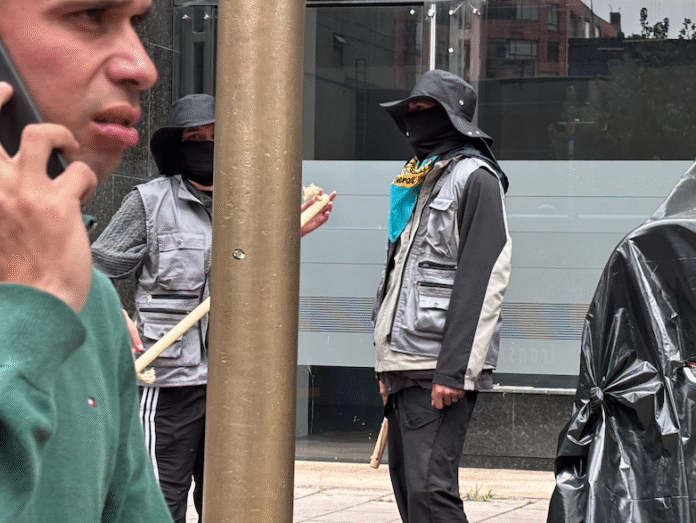
A wave of coordinated protests and building occupations by the social movement known as the “Congress of the Peoples” has raised alarms in Bogotá this week, after Interior Minister Armando Benedetti claimed that “criminal structures” are behind the unrest, pointing to alleged infiltration by armed groups, most notably the National Liberation Army (ELN) guerrilla.
The movement, which brings together Indigenous communities, rural organizations, student groups, and extreme left-wing collectives, began its gathering in the capital on Monday by occupying the National University of Colombia, setting up encampments and blocking access to students and staff. By Tuesday, members and allied groups had extended their actions to five government buildings, including the Ministry of the Interior, Ministry of Housing, Ministry of Agriculture, the National Land Agency (ANT), and the Victims Unit.
In the San Martín neighborhood (Carrera 7 with Calle 32) masked protesters barricaded the entrance to the Sociedad de Activos Especiales (SAE) offices, blocking pedestrian traffic and intimidating passersby in what organizers described as a “humanitarian camp.” City security officials have reported widespread vandalism in the area, including graffiti with slogans such as “Death to the Capital,” “Sabotage the Rich,” and “Resist.”
The situation escalated further on Thursday morning, when a group of hooded individuals stormed the Veinte de Julio TransMilenio station in southern Bogotá. Videos circulating on social media show protesters forcing their way into the station, blocking bus lanes, covering security cameras, and encouraging passengers to evade fares. The incident forced the temporary suspension of operations at one of the city’s busiest transport hubs.
Interior Minister Armando Benedetti said that the events could not be considered ordinary demonstrations.
“The only thing that isn’t obvious is that these social organizations don’t want to engage in dialogue with a government of dialogue. And it’s also not obvious that they should be allowed to take over five government buildings, forcing hundreds of people to evacuate in panic and preventing anyone from working for two days. That’s not obvious! What is obvious is that you only get your information from the press,” Benedetti said in response to the Ombudsman’s Office, which had rejected his earlier statements.
Benedetti debunked the statement from the Defensoria del Pueblo, adding: “I don’t want to be tough, but I have to be, because it’s unacceptable that they come to Bogotá supposedly to negotiate, and yet they’re taking over all the State institutions. How can they say we’re not paying attention to them when it hasn’t even been two or three working hours on Tuesday and they’re already occupying the institutions?”
The Ombudsman’s Office defended the protesters’ right to mobilize and criticized the minister’s remarks, stating that “social protest is a right and the government is the first authority responsible for guaranteeing it, not stigmatizing social movements.”
The events have ignited a political backlash. Former presidential candidate Enrique Gómez went as far as to call the Congress of the Peoples a “terrorist takeover.”
“What’s happening is extremely serious,” stated Gómez. “The urban arm of the ELN, which calls itself the Congress of the People, is carrying out a terrorist takeover at this hour at the 20 de Julio TransMilenio station. What is happening Carlos Fernando Galán that they (the police) don’t act?” highlighted Gómez.
Political analyst and commentator Carlos Ayala believes that the protests have taken on a threatening dimension. “The so-called Congress of the People is nothing more than an urban arm of the ELN. The takeover of the San Martín Shopping Center adds to the constant aggression against passersby, who cannot approach the area without being berated by a group of violent hooded individuals. And Carlos Fernando Galán? Yes, he’s just for show. There is no Mayor,” Ayala stated in a video post on “X”.
Medellín Mayor Federico “Fico” Gutiérrez, suggested the protests were part of a broader destabilization attempt by illegal armed groups. “Watch out, Colombia. They want to take over the cities we represent as opposition to the Petro government. They’ve already activated the ‘First Lines’ and groups funded by the drug-trafficking guerrillas. They’re seeking anarchy under the excuse of social protest. What happened last week in Medellín and what’s happening now in Bogotá is proof of that,” he said.
Authorities have not presented evidence directly linking the protests to the ELN, but security analysts note that the Congress of the Peoples has historically maintained ideological and operational proximity to the guerrilla, particularly through urban cells.
Mayor Carlos Fernando Galán has deployed additional police to protect the capital’s transportation hubs and has called on protesters to keep demonstrations peaceful. But until the Congress of the Peoples decides to abandon Bogotá, residents can expect more waves of vandalism, road blockades and roiling attacks against public infrastructure.
